Advertisement
Amid deep grief in Lewiston, calls for gun control from victims' families and lawmakers
Resume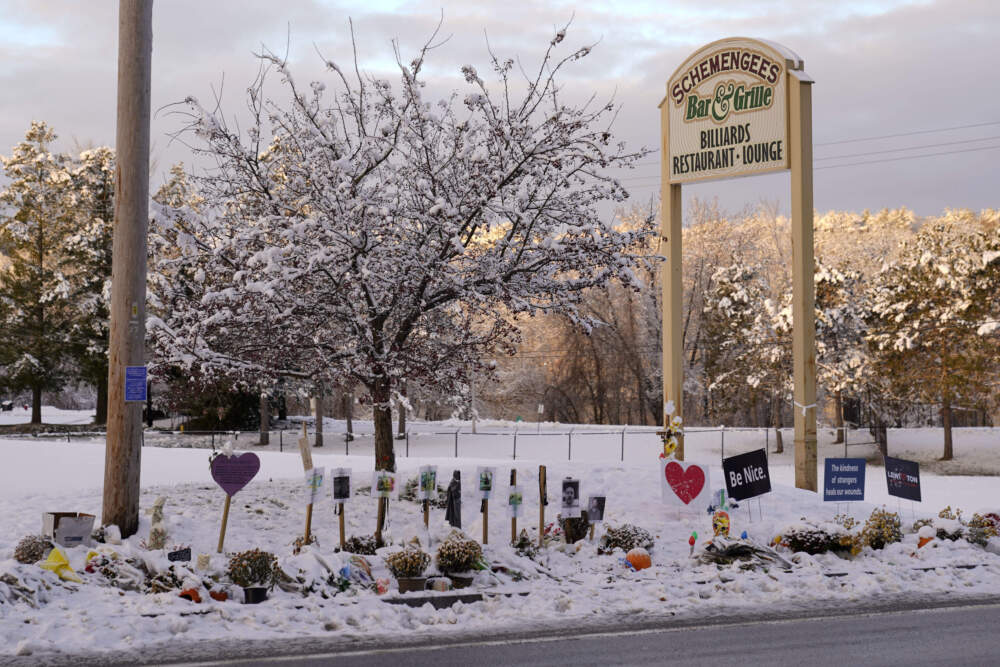
LEWISTON, MAINE — Decorations are on display and holiday music plays in many shops along Lisbon Street in the heart of downtown Lewiston. Not far away, a Christmas tree and menorah light up Dufresne Plaza. But in store windows and along sidewalks, "Lewiston Strong" signs also hang, reminders that many families, bracing for the holidays, are still coping with deep grief from a mass shooting in October.
Six weeks after a gunman opened fire at Schemengees Bar & Grille and the Just-in-Time Recreation bowling alley, killing 18 people and injuring 13 others, some family members of victims are speaking out in favor of stricter gun control laws.
"There has to be some basic common sense here," said Arthur Bernard, whose son, Artie Strout, was shot dead at Schemengees.
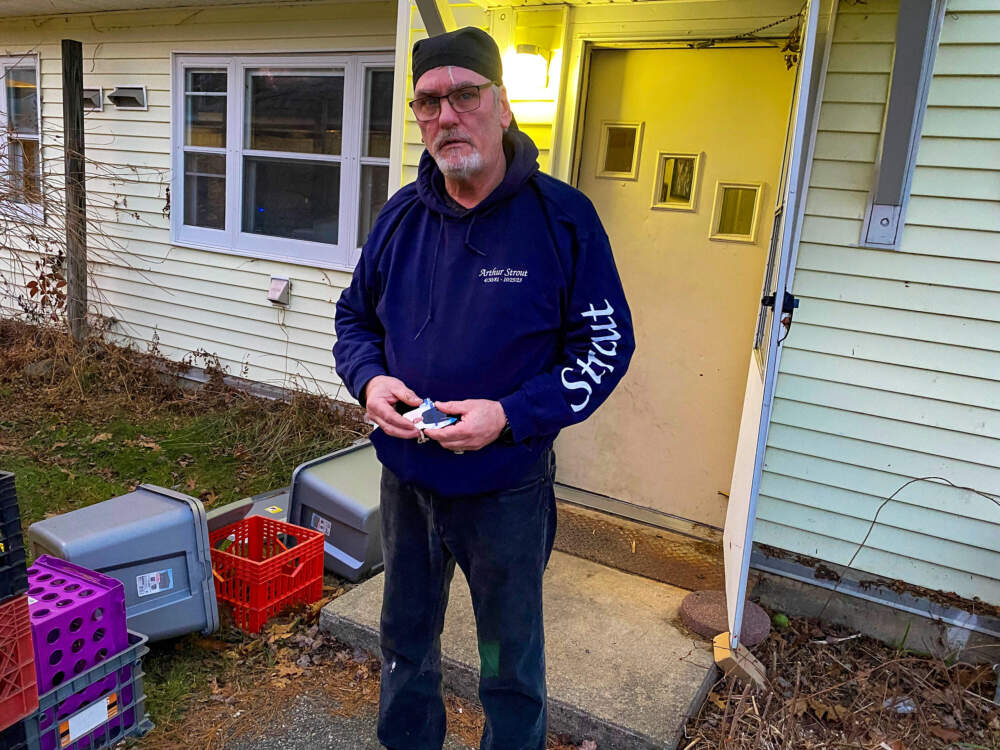
The father and son were together playing pool the night of Oct. 25. Bernard decided to head home early, while Strout stayed to hang out a little longer.
"He said, 'I love you,'" Bernard recalled, his voice shaky with emotion. "I hadn't driven a mile, and I got a call."
Strout, 42, was among the dead. The last picture on Strout's cell phone, recovered from his body, was of his dad, holding a pool cue not long before that night turned so dark. Now Bernard finds himself in the role of activist, pushing to restrict access to the kind of weapon that killed his son.
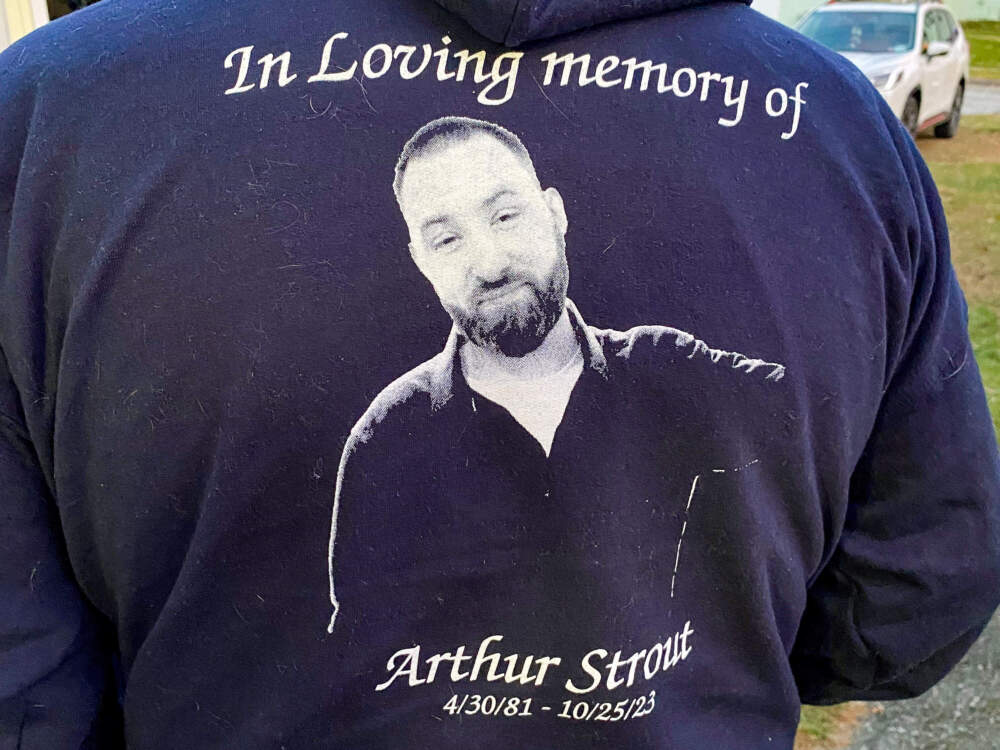
The gunman, Army reservist Robert Card, who took his own life at the end of a two-day manhunt, had several weapons that police recovered. Among them was a high-capacity, semi-automatic Ruger AR-10 rifle and a Smith & Wesson AR-15-style rifle. Card had purchased the guns legally, a fact that has prompted Bernard and others to call for a ban on these semi-automatic rifles.
"I understand gun rights," Bernard said. "But assault rifles — they're not made for anything but killing."
As is the case in so many American communities scarred by this kind of carnage, the politicized has become deeply personal. Bernard and other Mainers who never before waded into the gun debate are now advocating for stricter laws in the wake of the worst mass shooting in the state's history.
"It's been quite an experience that none of us thought we'd ever face in our life," said Leroy Walker, a city councilor in Auburn, just across the Androscoggin River from Lewiston.
On the night of the shootings, Walker's son, Joe, was working as the manager at Schemengees. A corn hole tournament was underway, and a few people were playing pool when the killer entered and opened fire.
When news of the attack broke, Walker launched a desperate effort to learn if his son had survived. A longtime city government employee who spent decades as a parks superintendent and the past dozen years on the city council, Walker spent hours on the phone, calling the bar, the police and Central Maine Medical Center, trying to find out something, anything, about his son.
"It was an awful thing to have to wait," he said.
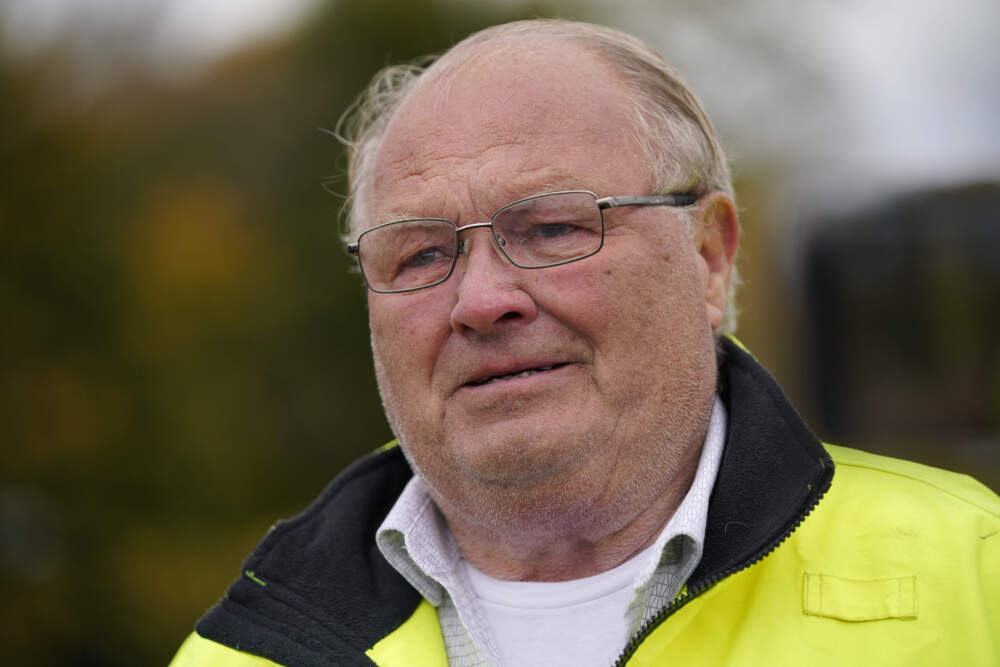
Finally, state police confirmed the family's worst fears: Joe Walker had been shot and killed at the scene — but not before he had grabbed a knife and lunged at the gunman in an effort to stop the deadly rampage.
"We found out that my son was a hero," Walker said proudly.
Kathy Lebel, the owner of Schemengees, said she wasn't surprised Walker put his life on the line to try to stop the gunman. He treated all customers like friends and family, she said, but he was never shy about confronting a rowdy patron or shutting off a customer who'd had too much to drink.
"He was amazing," she said. "Joe would never back down from anybody for anything."
Lebel was one of the lucky ones. She wasn't at the bar that night; she had the day off. She has an almost eerie memory of worrying about Walker's bravery. She had wondered what would happen if someone with a gun came into the bar one day and started shooting. She recalled Walker would always tell her, "I'm not afraid."
"But I was," she said.
Joe Walker was 57 and left behind a wife and their blended family of two children and three grandchildren.
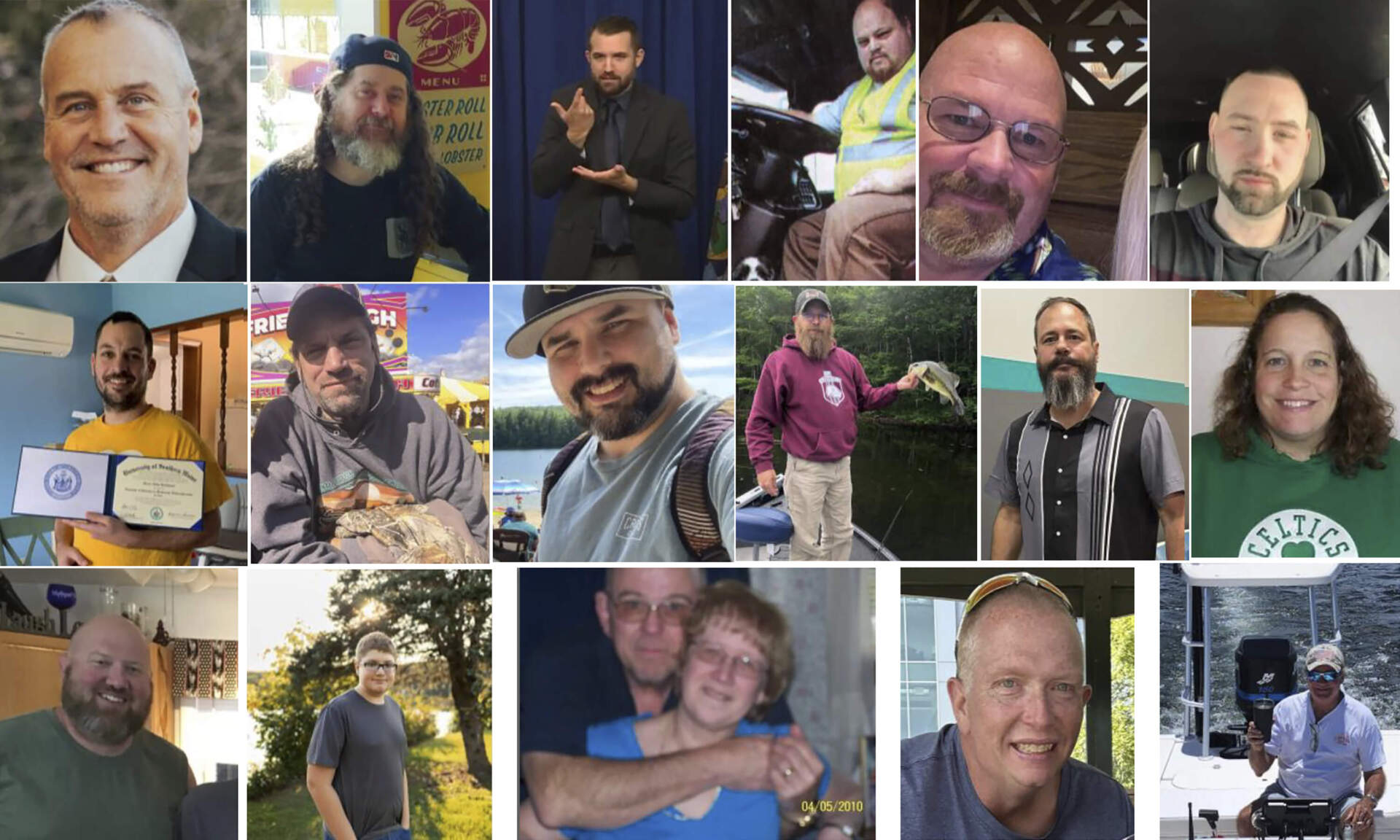
Following the death of his son, Walker said he now favors tougher gun control, though he wouldn't go as far as calling for an outright ban on semi-automatic rifles. He said there should be a way "to control how these weapons are fired" so they can't kill so many people in mere seconds.
"That needs to change somehow," Walker said.
With a long tradition of gun ownership and hunting, Maine has some of the least restrictive gun laws in New England. But in reaction to the shootings, some state lawmakers plan to press for stricter gun control when the Legislature convenes in January.
"I am struck by how many times I've heard, 'We never thought it would happen here,' " said Margaret Craven, a Democratic state representative from Lewiston, referring to the shock that many people in Maine have expressed about the killings. "I mean, it's happening everywhere," she said.
Craven is pushing for a series of gun control measures, including a red flag law, which would allow police to temporarily confiscate weapons from people at risk of endangering themselves or others. She also favors background checks on gun purchases and a ban on assault weapons.
"I am struck by how many times I've heard, 'We never thought it would happen here.' I mean, it's happening everywhere."
Maine Rep. Margaret Craven
In the past, there's been little appetite for these kinds of laws in the state Legislature, but Craven said the violence in Lewiston has cracked opened a door to possible change. She said she's encouraged that Gov. Janet Mills, a Democrat, who in the past has opposed bans on semi-automatic rifles and high-capacity magazines, now concedes "action is needed."
At the federal level, there are also new efforts to fight for stricter laws and push back on the gun lobby's influence. Congressman Jared Golden, a centrist Democrat who lives in Lewiston, had long opposed a ban on weapons like semi-automatic rifles. But a day after the shootings in his home town, he came out in favor of one.
And, U.S. Sen. Angus King, an independent, is co-sponsoring legislation that stops short of a ban but would limit the number of rounds these weapons can carry.
"The key here is that in the midst of a mass shooting, it's when the shooter has to re-load that there's an opportunity either for people to escape or to disarm the shooter," King told reporters in a recent video call.
The National Rifle Association and other gun rights groups have criticized King's proposal. Historically, gun control efforts have faced stiff resistance in Congress.
"We think that initiative really has no chance of going anywhere," said David Trahan, executive director of the Sportsman's Alliance of Maine, an influential gun rights organization in the state.
Trahan's group helped write Maine's so-called "yellow flag" law, a weaker version of the "red flag" laws many other states have enacted in recent years. The laws provide a mechanism for police to take guns away from people deemed dangerous, but in Maine, a doctor must conduct a medical evaluation first. In the case of the Lewiston shooter, the law didn't work, despite multiple warnings he was suffering a mental health crisis and owned numerous guns.
Trahan said there were already "plenty of laws" on the books that should have stopped Card, but a succession of people failed to take action to protect the public.
"For some reason, this guy fell through the cracks," he said.
Trahan embraces an often-cited pro-Second Amendment argument that any new laws should focus on mental health, not on guns. But gun control advocates argue states with the lowest rates of gun violence — like Massachusetts — have laws that target both. They often have red flag laws, mandatory background checks, bans on semi-automatic rifles and high-capacity magazines, among other restrictions to safeguard public safety.
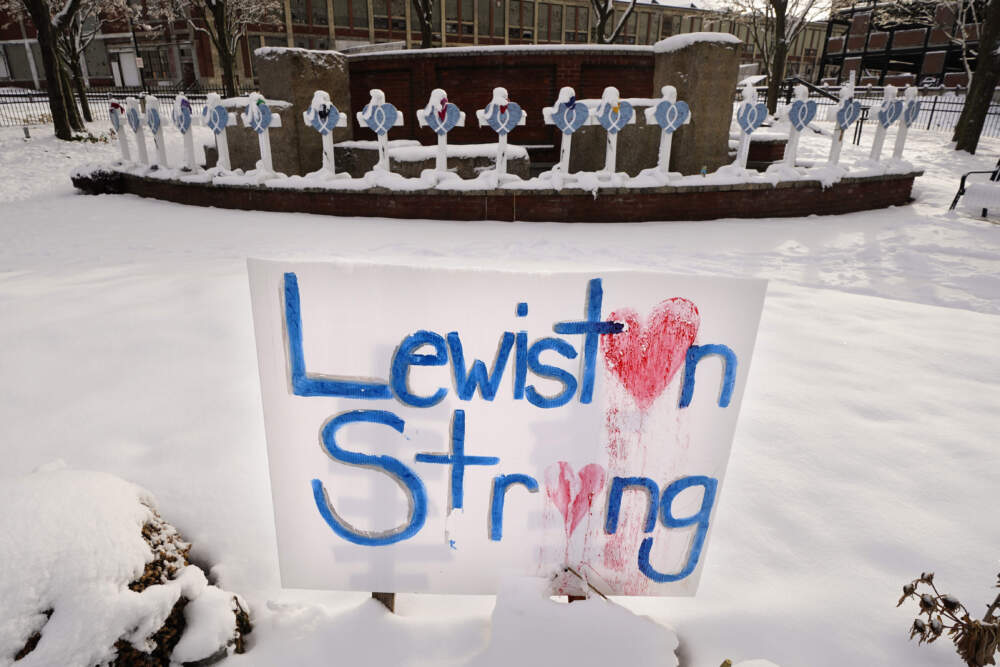
Arthur Bernard said Maine should follow suit to save lives and spare more families from suffering — even if it's too late for his son. Artie Strout left behind five children, including a daughter, who turned 14 six days after the shooting.
"Her mom has been trying to talk to her about what she wants for Christmas," Bernard said, as he tried to hold back tears. "She keeps telling her mom, 'You can't give me what I want.' "
Bernard's grief is shared across the country. The attack in Lewiston that killed his son, Leroy Walker's son and 16 other victims was the 34th mass shooting this year in America. Since the Lewiston shootings, there have been at least five more.
This article was originally published on December 12, 2023.
This segment aired on December 12, 2023.
